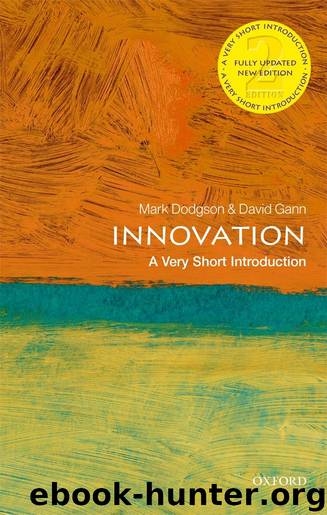Innovation by Mark Dodgson & David Gann

Author:Mark Dodgson & David Gann
Language: eng
Format: epub
ISBN: 9780192558619
Publisher: Oxford University Press
Published: 2018-06-15T00:00:00+00:00
Government
The debate about the role of the government in supporting innovation commonly reflects political ideology. State intervention in innovation is considered essential in many nations, including most Asian countries who see it as crucial to economic and social development. However, in more ‘free-market’ economies, such as the USA, rhetorically at least, government intervention is regarded sceptically and avoided, usually with reference to government’s inability to ‘pick winners’. Nonetheless, the past polarities of the views that argue, on the one hand, that interventionist innovation policies distort markets and promote inefficiencies or, on the other, are essential components of sound economic planning and effective industry policies are tending nowadays towards a pragmatic middle ground. Here it is recognized that government has an important role to play in innovation, but policies have to be selective.
Governments contribute to innovation in many ways apart from their innovation policies. A stable, growing economy enhances the preparedness of firms and individuals to invest in innovation and take risks. Effective monetary and fiscal policies are crucial in providing confidence in the future. A nation with more wealthy firms and individuals is better placed to be innovative. Good educational policies produce employees and entrepreneurs with skills to create, assess, and realize opportunities for innovation. Well-educated citizens are more capable of contributing to national debates on innovation, and determining which sciences and technologies are acceptable, and what form new products and services should take. Government investments in research—which in developed nations account on average for about one-third of total expenditures on R&D—provide many of the opportunities for innovation. These investments can often take a longer perspective than those made in the private sector. Competition policies prevent monopolies erecting barriers to innovation; trade policies increase the size of markets for innovative products and services; intellectual property laws can provide incentives to innovate; regulations in areas such as environmental protection stimulate the pursuit of innovation. Free and open access to information stored by government increases opportunities for innovation. Innovation in a highly digitally connected world is inhibited unless government acts to ensure personal privacy and encourage ethical codes of practice when it comes to the collection and use of data. Open immigration policies allow the flow of talent from overseas and are the source of diversity, which is so important for innovative thinking. Industrial relations laws can help provide equitable, secure, and participative workplaces encouraging of innovation.
Governments can encourage innovation through their procurement power: they are the primary purchaser of innovation in any nation. Public expenditures on IT, infrastructure, pharmaceuticals, and many other areas, exceeds that of the private sector, so government purchasing is a major stimulus to innovation.
Leadership by governments can set a tone or atmosphere in which innovation is encouraged. When the political discourse is future orientated and ambitious—think of John F. Kennedy’s plan to have ‘man on the moon’, or Harold Wilson’s ‘white heat’ revolution of science and technology, or President Xi’s vision and mandate for innovation to modernize the Chinese economy—it is more supportive of innovation than when it is relaxed and comfortable with the status quo or attached to a romanticized vision of the past.
Download
This site does not store any files on its server. We only index and link to content provided by other sites. Please contact the content providers to delete copyright contents if any and email us, we'll remove relevant links or contents immediately.
Hit Refresh by Satya Nadella(9137)
The Compound Effect by Darren Hardy(8969)
Change Your Questions, Change Your Life by Marilee Adams(7783)
Nudge - Improving Decisions about Health, Wealth, and Happiness by Thaler Sunstein(7707)
The Black Swan by Nassim Nicholas Taleb(7129)
Deep Work by Cal Newport(7085)
Rich Dad Poor Dad by Robert T. Kiyosaki(6633)
Daring Greatly by Brene Brown(6514)
Principles: Life and Work by Ray Dalio(6449)
Playing to Win_ How Strategy Really Works by A.G. Lafley & Roger L. Martin(6308)
Man-made Catastrophes and Risk Information Concealment by Dmitry Chernov & Didier Sornette(6019)
Big Magic: Creative Living Beyond Fear by Elizabeth Gilbert(5774)
Digital Minimalism by Cal Newport;(5765)
The Myth of the Strong Leader by Archie Brown(5508)
The Slight Edge by Jeff Olson(5418)
Discipline Equals Freedom by Jocko Willink(5390)
The Motivation Myth by Jeff Haden(5213)
The Laws of Human Nature by Robert Greene(5208)
Stone's Rules by Roger Stone(5088)
